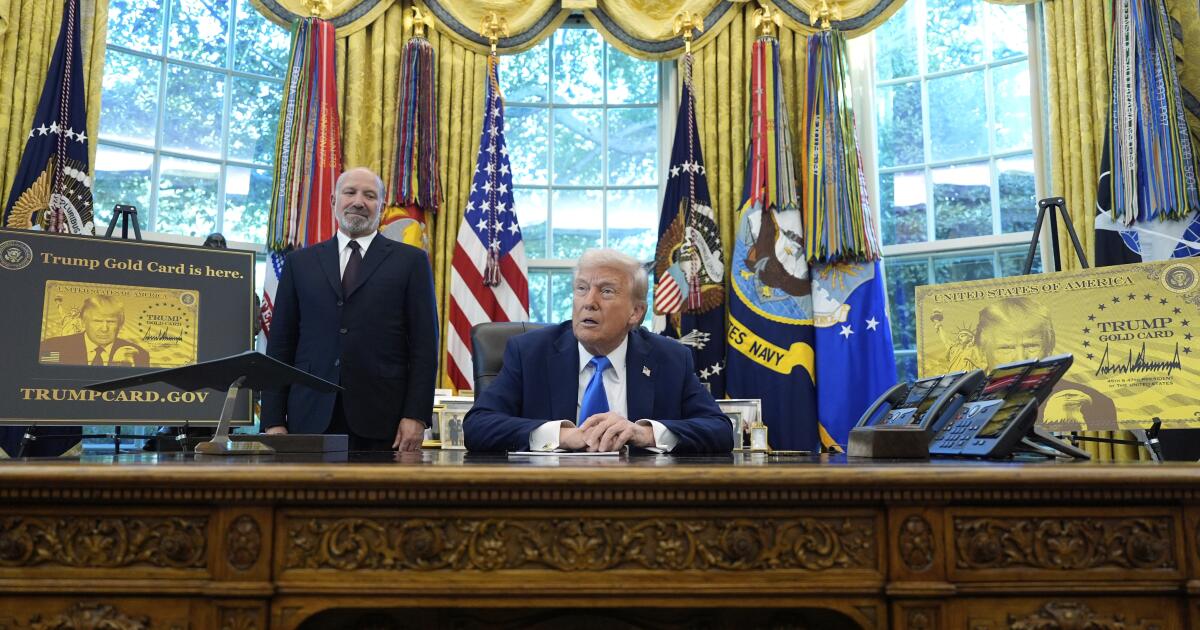Donald Trump blamed Democrats and diversity, equity and inclusion policies for a collision between a commercial jet and military helicopter that killed 67 people just outside of Washington.
Without citing evidence, the president said that his “common sense” assessment was that the accident was caused by lax safety standards as a result of DEI policies introduced by his predecessors.
“There are no survivors,” Trump told reporters on Thursday as he took to the podium in the White House press briefing room for the first time in his second presidency.
The regional American Airlines flight, which was operated by its subsidiary PSA Airlines, had originated in Wichita, Kansas. The Bombardier CRJ700 jet was making its approach into Washington Reagan National Airport on Wednesday night when it collided with a US army Sikorsky H-60 Black Hawk helicopter, plunging into the Potomac River.
The fuselage of the commercial jet was found in three pieces in the water. The American flight had 60 passengers and four crew members on board, while three soldiers were in the Black Hawk.
Trump, who was flanked by his vice-president and newly sworn in secretaries of defence and transportation, began his remarks with an appeal for unity in “a moment of anguish”, when “the differences between Americans fade to nothing”.
But he quickly launched into a political attack against Democrats, saying that ex-presidents Barack Obama and Joe Biden had lowered standards for who was allowed to qualify to be an air traffic controller.
“I put safety first, Obama, Biden and the Democrats put policy first . . . and their politics was even worse.”
He said that “for an air traffic controller, we want the brightest, the smartest, the sharpest. We want somebody that’s psychologically superior,” adding that “I don’t think” people with “severe disabilities” should be air traffic controllers.
After appearing to blame air traffic controllers for the accident, he then turned his attention to the crew of the Black Hawk.
“You had a pilot problem from the standpoint of the helicopter, because it was visual. It was very clear night . . . the American Airlines plane had lights blazing”, Trump said.
“I have helicopters. You can stop a helicopter very quickly. It had the ability to go up or down, had the ability to turn, and the turn it made was not the correct one”, he added.
US defence officials said the Black Hawk was being flown by an experienced crew on routine training.
Trump said that investigators were trying to determine whether the troops were using night vision equipment, which “may change your view” from the cockpit. A defence official said the army could not confirm whether the crew was wearing the night vision goggles.
Defence secretary Pete Hegseth said the three soldiers in the helicopter “were on a routine annual night flight retraining on a standard corridor for a continuity of government mission”.
“Tragically, last night, a mistake was made . . . there was some sort of an elevation issue that we have immediately begun investigating at the DoD and army level,” he said, adding that what happened was “absolutely unacceptable”.
Earlier on Thursday, officials said responders had recovered 28 bodies from the American flight and one body from the Black Hawk so far.
Trump said that Russian citizens were aboard the flight and that the US would facilitate the repatriation of their bodies. There has been no direct air travel between the US and Russia since Moscow’s full-scale invasion of Ukraine.
Serious aviation accidents are rare in the US. The last major crash involving a US commercial aircraft was in 2009, when 49 people were killed on board a Colgan Air flight which crashed into a house near Buffalo, New York.
Trump urged people to keep flying.
Additional reporting by Felicia Schwartz in Washington







































